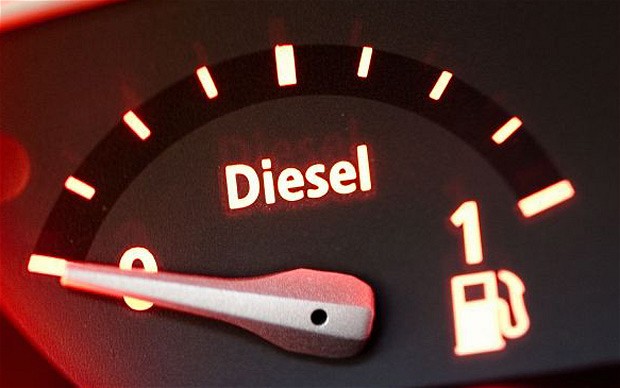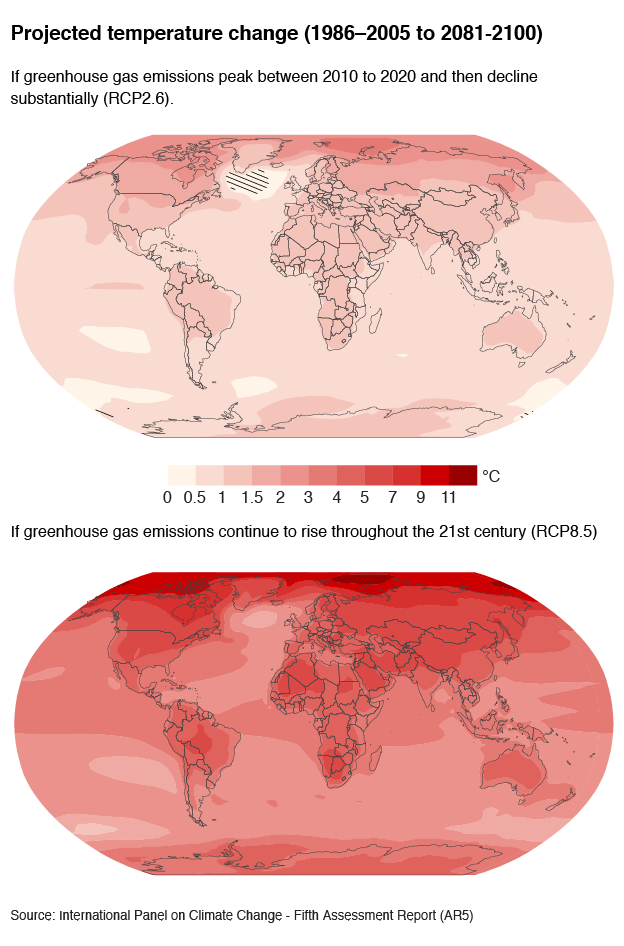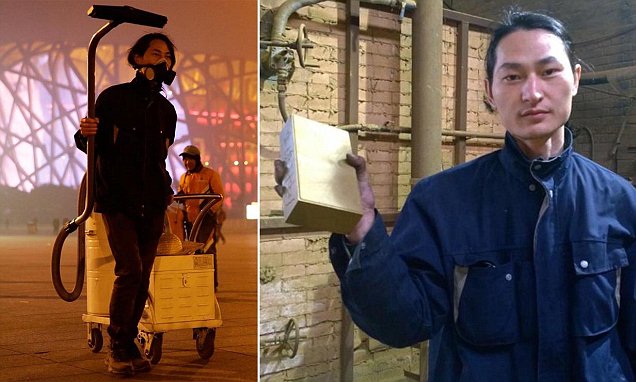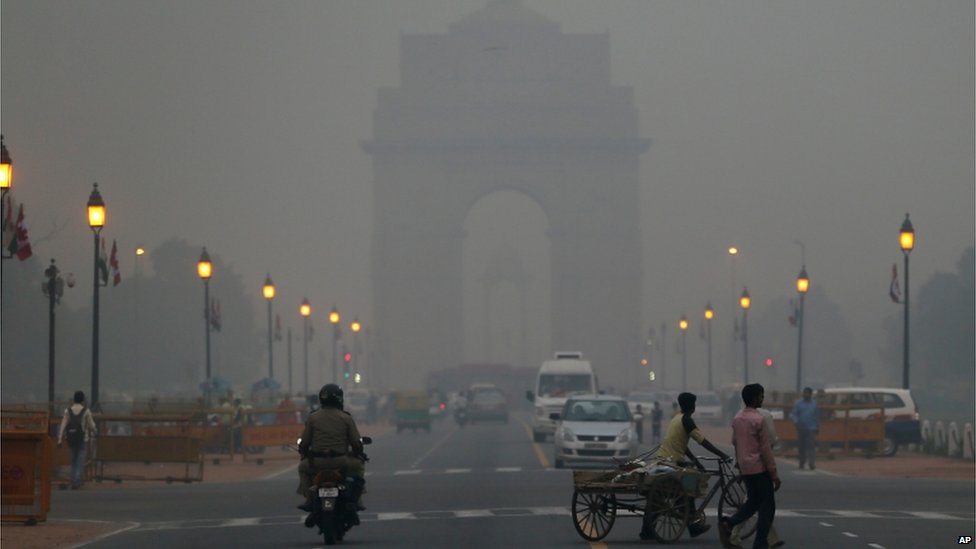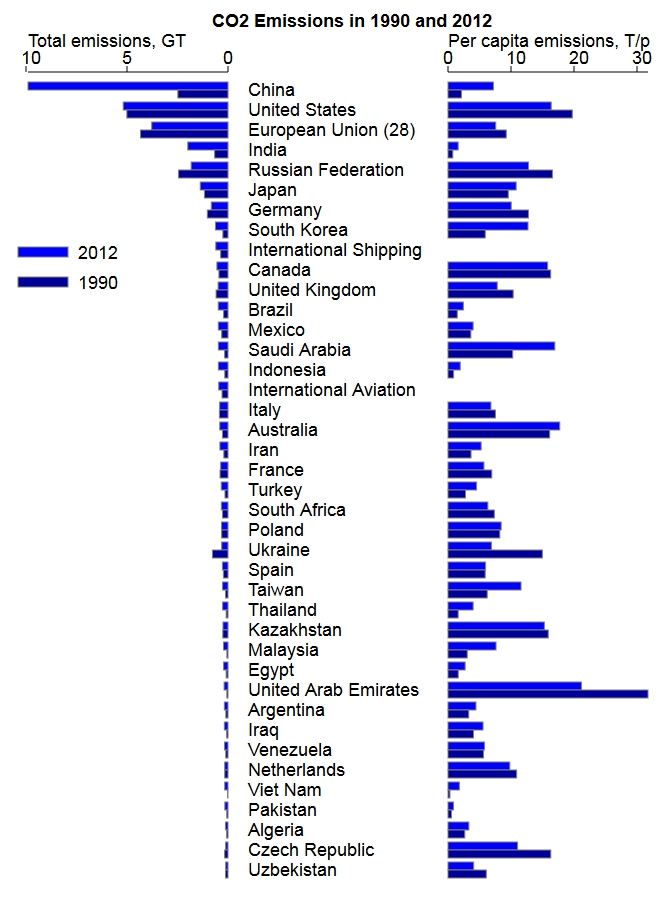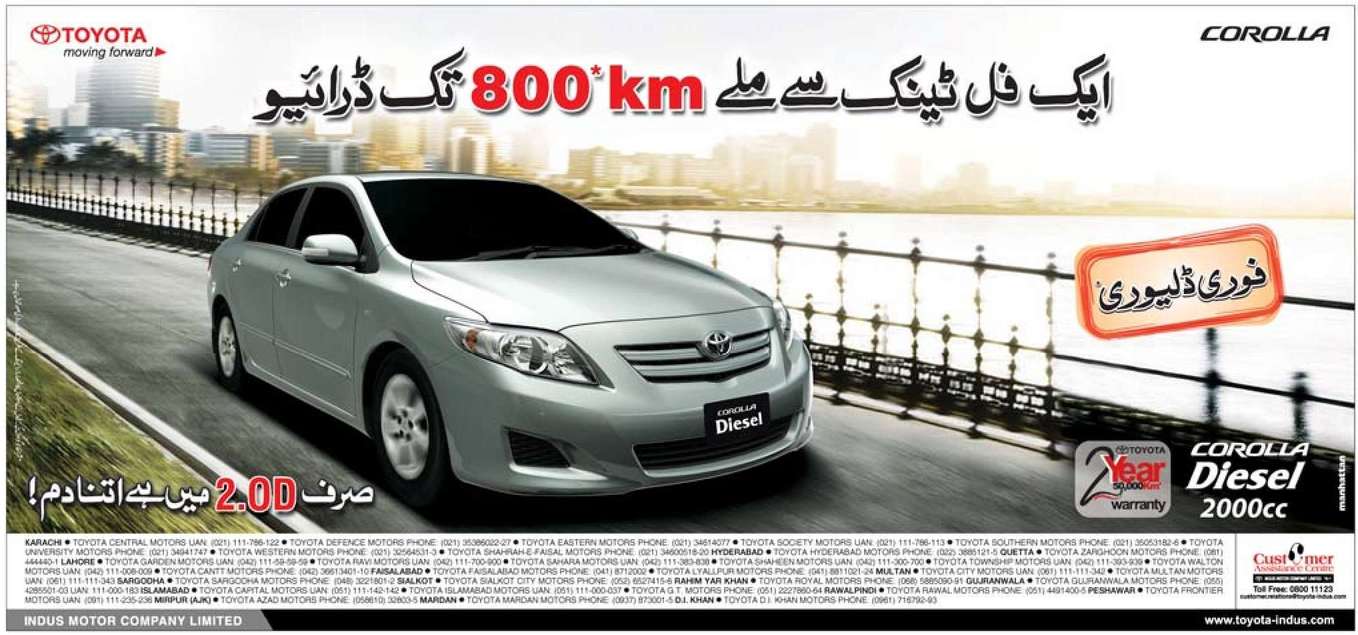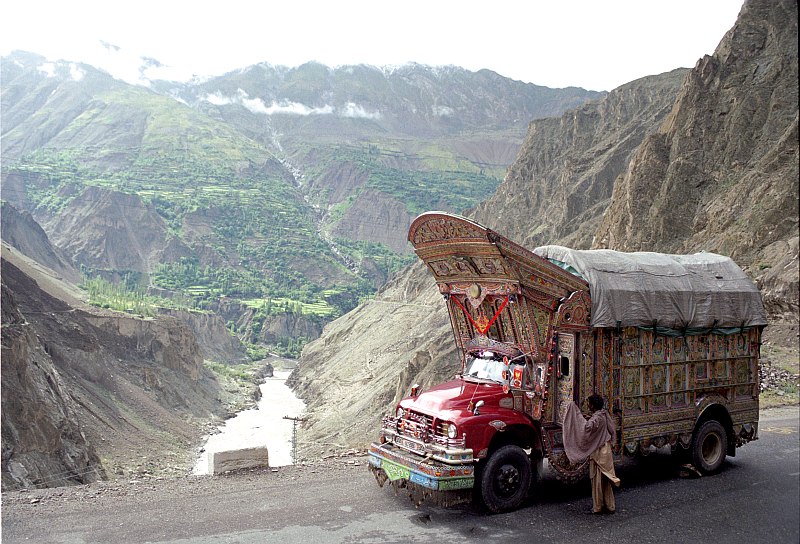ڈیزل سے چلنے والی گاڑیاں اب قصہ پارینہ بن چکیں!
پیرس میں دنیا بھر کے سربراہان مملکت بڑھتی ہوئی ماحولیاتی آلودگی پر قابو پانے کے لیے سر جوڑ کر بیٹھے۔ ریاستہائے متحدہ امریکا، یورپ اور چین اس وقت سب سے زیادہ “گرین ہاؤس گیس” بنا رہے ہیں۔ اقوام متحدہ ماحولیاتی تبدیلی کانفرنس 2015 کا انعقاد 12 دسمبر 2015 کو فرانس کے دارالحکومت پیرس میں کیا گیا۔ یہ پہلا موقع ہے کہ کانفرنس میں شریک تمام ممالک نے فضائی آلودگی اور گرین ہاؤس گیس سے متعلق سنجیدہ اقدامات اٹھانے پر اتفاق کیا ہے۔ یہ بلاشبہ ایک تاریخی پروگرام تھا۔ تقریباً 200 ممالک کے نمائندے مل کر اس مسئلہ پر قابو پانے کے لیے متفق ہوئے۔ ان ممالک نے طے کیا کہ فضائی آلودگی کا باعث بننے والے عوامل پر قابو پانے اور دنیا کے مجموعی درجہ حرارت کو 2 ڈگری سینٹی گریڈ سے کم رکھنے کے لیے کوششیں کی جائیں گی۔ سب سے زیادہ فضائی آلودگی کے شکار ممالک میں چین پہلے، امریکا دوسرے جبکہ روس تیسرے نمبر پر آتا ہے۔ اس فہرست میں پاکستان کا شمار 36 ویں درجے پر کیا جاتا ہے۔
اب سے چند روز قبل بھارت نے وفاقی دارالحکومت نئی دہلی میں ڈیزل گاڑیوں پر پابندی عائد کردی ہے۔ اب وہاں کوئی نئی ڈیزل گاڑی رجسٹر نہیں کی جاسکے گی۔ یل یونیورسٹی کی ماحولیاتی آلودگی سے متعلق رپورٹ میں انکشاف کیا گیا تھا کہ نئی دہلی چین کے شہر بیجنگ کو پیچھے چھوڑتے ہوئے سب سے زیادہ آلودہ شہر بن گیا ہے۔ بیجنگ شہر میں چھائے دھوئیں کے بادل اس قدر گہرے اور خطرناک تھے کہ قومی دن کے موقع پر فضائی کرتب دکھانے کے لیے چین کو کئی کارخانوں کو بند اور گاڑیوں پر پابندی عائد کرنا پڑی۔ آلودگی کی شدت کا اندازہ لگانے کے لیے ایک چینی فنکار نے 100 دن تک بیجنگ کی فضا کو ویکیوم کلینر میں جمع کیا اور پھر اس سے حاصل ہونے والے فضلے سے ایک اینٹ بنا ڈالی۔ اگر بیجنگ کا یہ حال ہے تو پھر دہلی کا اندازہ آپ خود بھی لگاسکتے ہیں۔
یہ بھی پڑھیں: فضائی آلودگی کے خلاف چین کی جنگ
بہرحال 12 دسمبر کو نیشنل گرین ٹرائبیونل (این جی ٹی) نے ریاست کے ماحولیاتی تحفظ کے لیے چند ہم قوانین کا اعلان کیا۔ این جی ٹی نے وفاقی و علاقائی حکومتوں کو نئی ڈیزل گاڑیوں کی خرید و فروخت پر پابندی کا بھی مشورہ دیا۔ یاد رہے کہ اپریل میں گرین کورٹ کی جانب سے 10 سال پرانی ڈیزل گاڑیوں پر پہلے ہی پابندی عائد کی جاچکی ہے۔
دنیا کے تمام بڑے اور معروف کار ساز ادارے اپنے انجن کی کارکردگی بہتر بنانے کے لیے اسے ٹربو چارجرز سے جوڑ رہے ہیں یا پھر ان کے سائز تبدیل کر رہے ہیں۔ ان کا مقصد ایسے چھوٹے انجن بنانا ہے جو ایندھن کے باکفایت استعمال کے ساتھ تیز رفتاری فراہم کریں لیکن خارج ہونے والے فضلے کی تعداد کم ہو۔ انجن کے ساتھ ٹربو چارجرز لگانے کا مقصد کم استعمال کے باوجود زیادہ ٹارک فراہم کرنا ہے۔ ووکس ویگن جیسے معروف کار ساز اداروں نے 2000 کی دہائی میں ٹربو چارجڈ انجن کا استعمال شروع کردیا تھا جس کا مقصد امریکا کے EPA اور یورپ کی جانب سے بنائے گئے یورو معیارات پر پورا اترنا تھا۔ ٹویوٹا کے علاوہ باقی تمام بڑے ناموں نے اسی حکمت عملی کو اپنایا۔ لیکن جاپانی کارساز ادارے ٹویوٹا کا کہنا ہے کہ ہائبرڈ ٹیکنالوجی اس کا بہترین نعم البدل ہے۔ ووکس ویگن کا حالیہ ڈیزل گیٹ اسکینڈ سامنے آنے کے بعد کار ساز ادارے اب ڈیزل گاڑیوں کو جدید ماحولیاتی قوانین کے مطابق ڈھالنے میں ناکامی کا اعتراف کر رہے ہیں۔
ایک اندازے کے مطابق ڈیزل انجن پیٹرول انجن کے مقابلے میں 15 فیصد کم کاربن ڈائی آکسائیڈ بناتا ہے تاہم اس سے خار ہونے والی نائٹروجن ڈائی آکسائیڈ دیگر انجن کے مقابلے میں 22 فیصد زیادہ ہے۔ نائٹروجن آکسائیڈ کے ننھے ننھےزرات ہوا کے ذریعے انسان میں داخل ہو کر پھیپڑوں، دماغ اور دل کو شدید نقصان پہنچا سکتے ہیں۔ اب سے تقریباً 15 سال قبل 1997 میں ترقی یافتہ ممالک نے کاربن ڈائی آکسائیڈ کو 8 فیصد تک کم کرنے کے قانون پر اتفاق کے لیے کیوٹو پروٹوکول کلائمٹ چینج ایگریمنٹ پر دستخط کیے۔ جاپانی کار ساز اداروں بالخصوص ٹویوٹا نے ہائبرڈ ٹیکنالوجی پر تحقیق کا آغاز کردیا۔ امریکی اداروں نے بھی اس کی پیروی کی تاہم جرمن ادارے جیسے ڈائملر، بی ایم ڈبلیو اور ووکس ویگن نے ڈیزل گاڑیوں کی زبردست تشہیر جاری رکھی۔ اس وقت یہ کہاجاتا رہا کہ یہ کاربن کے اثرات کم کرنے کا تیز اور کم قیمت نسخہ ہے۔
گو کہ سب سے زیادہ آلودگی کا شکار ممالک کی فہرست میں پاکستان کا نمبر کافی نیچے آتا ہے لیکن پھر بھی ماحولیاتی آلودگی ہمارے لیے سنگین مسئلہ ہے۔ ہمارے ملک میں کارخانوں اور گاڑیوں کی تعداد کم ہونے کی وجہ سے ہم آلودگی میں بہت زیادہ اضافے کا باعث نہیں بن رہے لیکن ہمارے پڑوسی ممالک چین اور بھارت کا کیا دھرا ہمیں بھی بھگتنا پڑے گا۔ گذشتہ دس سالوں کے دوران پاکستان کے شمالی علاقہ جات میں درجہ حرارت 1.9 ڈگری سے زیادہ ہوچکا ہے۔شاید آپ یہ خیال کریں کہ اتنے سالوں میں تو محض چند ہی ڈگری درجہ حرارت تبدیل ہوا ہے تو اس سے زیادہ فرق نہیں پڑے گا۔ لیکن ایسا بالکل نہیں ہے۔ موسمی تبدیلی کے تناظر میں ‘معمولی’ سی تبدیلی بھی انتہائی خطرناک نتائج مرتب کرسکتی ہے جس سے درجہ حرارت میں اضافے سے آنے والی قدرتی آفات بھی شامل ہیں۔ گوکہ ہم دیگر ممالک کے مقابلے میں گرین ہاؤس گیسز کم پیدا کر رہے ہیں تاہم ہمیں اپنی حکمت عملی پر نظر ثانی کرتے ہوئے معدنی تیل پر انحصارف کو کم کرتے ہوئے ہوا اور سورج سے حاصل ہونے والی توانائی کے استعمال کو ترجیح دینا ہوگی۔
پاکستان میں بہت کم ڈیزل گاڑیاں موجود ہیں۔ ایک زمانے میں کرولا 2.0ڈی بہت پسند کی جاتی تھی تاہم انڈس موٹرز نے اسے 10 ویں جنریشن کرولا کے دور میں ختم کردیا۔ 1990 کی دہائی اور اوائل 2000 میں ڈیزل پر حکومت کی جانب سے بھاری رعایت دی گئی تھی جس کے بعد لوگوں نے انڈس موٹرز سے کرولا خریدنے پر بہت پیسے خرچ کیے۔ مجھے اچھی طرح یاد ہے کہ 99 میں میرے ایک دوست نے ٹویوٹا کرولا 1988 میں ڈیزل انجن صرف اس وجہ سے لگوالیا کہ ڈیزل ان دنوں سستا ہے۔ سال 2004-05 کے بعد ڈیزل کی قیمتوں میں زبردست اضافہ ہوا اور لوگوں کی دلچسپی میں شدید کمی واقع ہونا شروع ہوگئی۔
حقیقت یہ ہے کہ ڈیزل گاڑیوں کی کم ہوتی تعداد ہمارے لیے خوش آئند ہے۔ ممکن ہے ڈیزل گاڑیاں پسند کرنے والے شاید مجھ سے اتفاق نہ کریں۔ ڈیزل پر چلنے والی گاڑیوں میں ایک اہم حصہ مسافر اور مال بردار گاڑیوں کا بھی ہے۔ ہمارے یہاں بیڈفورڈ ٹرکس کئی دہائیوں سے استعمال کیے جا رہے ہیں جنہیں اب خیر باد کہہ دینا چاہیے۔ یہ ایک ایسا کام ہے جو یورپ کی طرح پاکستان میں بھی حکومت کو رضاکارانہ طور پر کرنا چاہیے۔ تقریباً 50 سال پرانے ٹرک کو نئے اور جدید ٹرک سے بتدیل کرنا گھاٹے کا سودا نہیں ہوگا۔ ہوسکتا ہے آپ کو یقین نہ آئے لیکن ہمارے یہاں بھی گاڑیوں کی حالت زار جانچنے کے لیے ایک محکمہ موجود ہے جو ہر بار سڑکوں پر گاڑی چلانے کا سرٹیفیکیٹ جاری کرتے ہوئے پوری گاڑی کا تفصیلی معائنہ کرتا ہے۔ یہ سرٹیفیکیٹ مسافر گاڑیوں کے لیے لازمی ہے اور ہر 6 ماہ بعد اس کی توسیخ کروائی جاتی ہے۔ ہر بار توسیخ کروانے کے لیے آپ کو اپنی بس یا وین محکمے کے پاس لے جانا ہوتی ہے جو اسے چیک کر کے آپ کو روڈ پر گاڑی چلانے کا اجازت نامہ جاری کرتا ہے۔ لیکن افسوس کی بات یہ ہے کہ یہ محکمہ انتہائی غیر فعال ہوچکا ہے جس کا اندازہ ریجنل ٹرانسپورٹ اتھارٹی کے اس بیان سے لگایا جاسکتا ہے کہ صرف 5 فیصد مسافر بردار گاڑیوں کے مالکان سرٹیفیکیٹ رکھتے ہیں باوجودیکہ ان کی گاڑیاں بھی سرٹیفیکیٹ جاری کیے جانے کی شرائط پر پوری نہیں اترتیں۔
ہم ایک ایسے دور میں آ چکے ہیں کہ جہاں پرتعیش اور مہنگی SUVs بھی پیٹرول پر چلائی جا رہی ہیں۔ پاکستان میں درآمد کی جانے والی اکثر گاڑیاں بھی پیٹرول ہی پر چلتی ہیں۔ لوگوں کا رجحان بھی ڈیزل گاڑیاں خریدنے کی طرف سے ہٹ چکا ہے اور اب یہ قصہ پارینا بنتی جا رہی ہیں۔ سوزوکی اب کوئی بھی ڈیزل گاڑی پاکستان میں فروخت نہیں کر رہی اور میری یاد داشت کے مطابق ہونڈا ایٹلس کے پاس بھی کوئی ڈیزل گاڑی برائے فروخت نہیں۔ ڈیزل گاڑیوں کی جگہ پیٹرول پر چلنے والی گاڑیوں نے لے لی ہے تاہم حقیقت یہ ہے کہ پیٹرول بھی اس مسئلے کا حل نہیں ہے خاص کر حکومتِ پاکستان اس سے بھاری سرمایہ بھی اکھٹا کر رہی ہے۔ OPEC بہت بڑی تعداد میں ایندھن بنا رہا ہے۔ خام تیل کی قیمتیں بھی 11 سال کی کم سے کم سطح پر پہنچ چکی ہے لیکن حکومت پاکستان تیلوں کی قیمتوں میں 50 پیسے اضافے سے متعلق سوچ رہی ہے۔ یاد رہے کہ دو ماہ قبل اکتوبر میں 50 پیسےسیلز ٹیکس کی مد میں شامل کیے گئے تھے۔ ڈیزل درآمد کیے جانے کی قیمت 40.54 روپے ہے جبکہ حکومت کی جانب سے صارفین کو فراہم کرنے کے لیے 84.04 روپے متعین کیے گئے ہیں۔
سی این جی کو بھی متبادل تصور نہیں کیا جاسکتا کیوں کہ قدرتی گیس کے معاملے ہم پہلے ہی شدید قلت کا شکار ہیں۔ آخری بار سی این جی اسٹیشن سے گاڑی میں گیس بھروا کر باہر آیا تو ایک صاحب فرمانے لگے کہ “گھروں میں روٹیاں پک نہیں رہیں، کاریں کیا چلنی ہیں”۔

